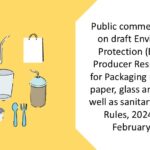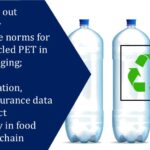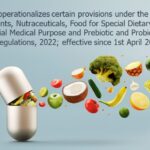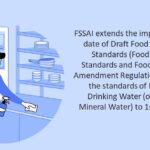The Food Safety and Standards Authority of India (“FSSAI”) has proposed to amend the Food Safety and Standards (Packaging) Regulations, 2018 (“Principal Regulation”) . The Draft Regulations is called the Food Safety and Standards (Packaging) First Amendment Regulations, 2021 and will come into force either on 1st January or 1st July subject to a minimum of 180 days from the date of their final publication in the official Gazette.
Objections or suggestions are invited on the Draft and the same may be sent to the address of the Chief Executive Officer, Food Safety and Standards Authority of India, Food and Drug Administration Bhawan, Kotla Road, New Delhi-110002 or sent on email regulation@fssai.gov.in within 18th March, 2021 after which the draft regulation will be taken into consideration.
The change proposed are detailed below:
| Principal Regulation | Draft Regulation | Implication |
| 4. Specific Requirements for Primary food packaging
…….. (4) Plastic materials intended to come in contact with food product (a) Plastic materials used for the manufacturing of containers for packing or storing the food products shall conform to either of the Indian Standards specifications as provided in Schedule – III Provided that Drinking Water (both Packaged and Mineral Water) shall be packed in colourless, transparent and tamper-proof bottles or containers made of polyethylene (PE) conforming to IS: 10146 or polyvinyl chloride (PVC) conforming to IS: 10151 or polyalkylene terephthalate (PET and PBT) conforming to IS: 12252 or polypropylene (PP) conforming to IS: 10910 or food grade polycarbonate conforming to IS: 14971 or polystyrene conforming to IS: 10142 or sterile glass bottles only. The transparency of a container shall not be less than 85 percent in light transmittance: Provided also that all pigments or colorants as specified in Indian Standard IS: 9833 may be allowed in plastic containers of five litre and above made of Polycarbonate and Polyethylene Terephthalate (PET) used for packaging of mineral water and packaged drinking water. The transparency of such containers shall not be less than 85 percent in light transmittance. |
4. Specific Requirements for Primary food packaging
..….. (4) Plastic materials intended to come in contact with food product (a) Plastic materials used for the manufacturing of containers for packing or storing the food products shall conform to either of the Indian Standards specifications as provided in Schedule – III Provided that Drinking Water (both Packaged and Mineral Water) shall be packed in colourless, transparent and tamper-proof bottles or containers made of polyethylene (PE) conforming to IS: 10146 or polyvinyl chloride (PVC) conforming to IS: 10151 or polyalkylene terephthalate (PET and PBT) conforming to IS: 12252 or polypropylene (PP) conforming to IS: 10910 or food grade polycarbonate conforming to IS: 14971 or polystyrene conforming to IS: 10142 or sterile glass bottles only. The transparency of a container shall not be less than 85 percent in light transmittance: Provided also that all pigments or colorants as specified in Indian Standard IS: 9833 may be allowed in plastic containers of five litre and above made of Polycarbonate and Polyethylene Terephthalate (PET) used for packaging of mineral water and packaged drinking water. The transparency of such containers shall not be less than 85 percent in light transmittance. Provided further that other food grade packaging materials compatible with the water to be packaged may also be used. In such cases requirements of transparent bottle would not apply. |
The draft regulation proposes that other food grade packaging materials which is compatible with the water can also be used in the packaging of mineral water and packaged drinking water. In this case, requisites of transparent bottle will not apply.
Presently for packaging of mineral water and packaged drinking water, plastic containers made of only Polycarbonate and Polyethylene Terephthalate (PET) must used. With this proposition, FSSAI is allowing the usage of other materials for packaging.
|
Source : Food Safety and Standards Authority of India




